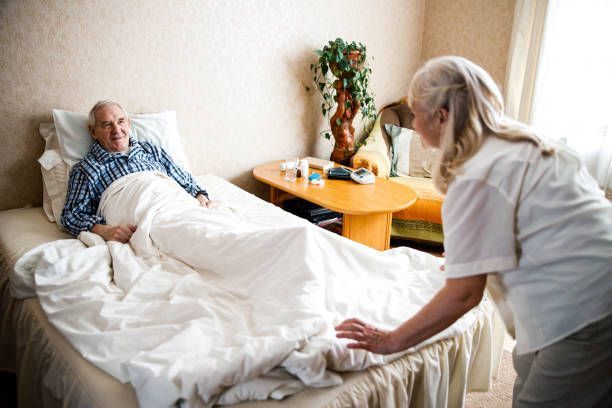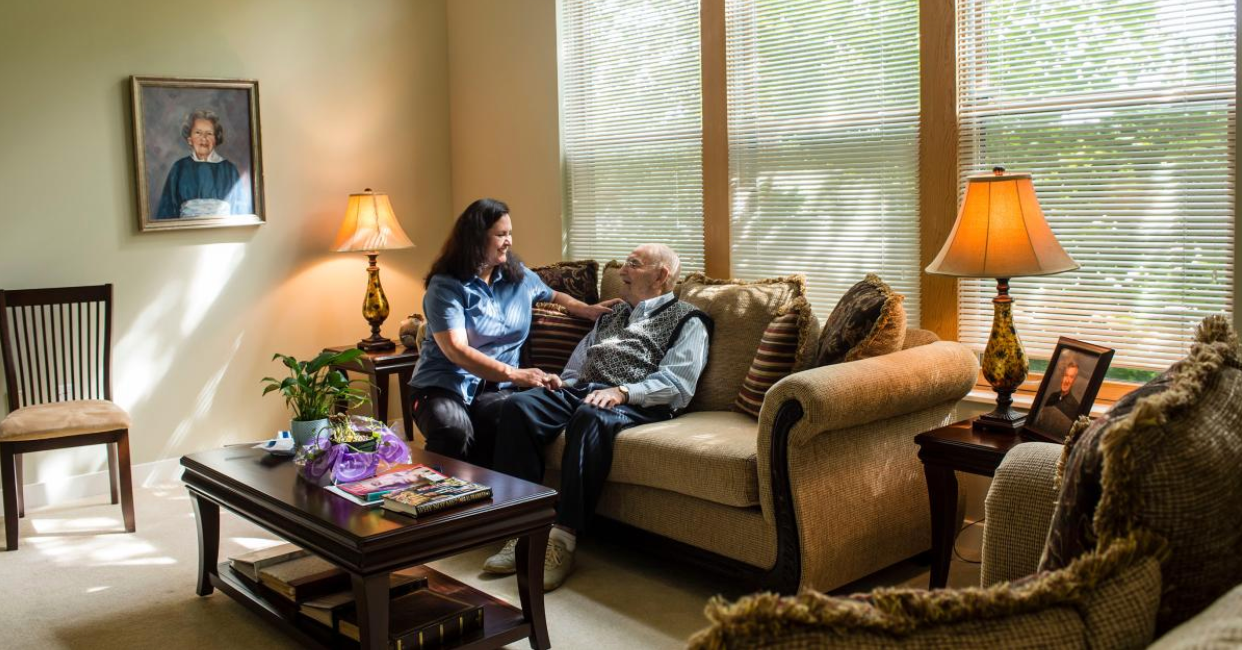Mental Health Care for Bedridden Patients: Complete Home Care Guide
Mental Health Care for Bedridden Patients: Complete Home Care Guide
Working with an experienced home care agency that specializes in mental health support for bedridden patients makes a critical difference in care outcomes and family peace of mind. Unlike general caregivers or family members who may lack specialized training, experienced agencies provide caregivers who are specifically trained to recognize early signs of depression, implement therapeutic communication techniques, and create structured sensory stimulation programs tailored to each patient's cognitive abilities and emotional needs. These agencies maintain detailed care documentation that tracks mood patterns, behavioral changes, and intervention effectiveness, allowing for data-driven adjustments to mental health support strategies. Professional agencies also provide essential backup support through registered nurses who can assess psychological changes, coordinate with mental health professionals when needed, and ensure families have 24/7 access to crisis intervention resources. Most importantly, experienced agencies understand that mental health care for bedridden patients requires consistency, patience, and specialized knowledge—qualities that come from years of training and hands-on experience with similar cases. This expertise translates into better patient outcomes, reduced family stress, and significantly improved quality of life for bedridden patients who might otherwise experience rapid psychological decline without proper mental health support. Call 7 Day Home Care today at (516) 408-0034 or visit here to learn how our trained caregivers support the mental health of bedridden seniors at home. 7 Day Home Care is the top private pay in-home care services provider throughout NYC, Manhattan, Queens, Brooklyn, and Long Island, New York. To learn more about our specialized dementia in-home care services, please call 516-408-0034.

How Do You Keep a Bedridden Person Mentally Stimulated?
Caring for a bedridden patient involves much more than managing their physical needs. While families focus on preventing bedsores, ensuring proper nutrition, and monitoring vital signs, they often overlook a critical aspect of care: mental health and sensory stimulation.
Being confined to a bed for extended periods creates profound psychological challenges that can lead to depression, anxiety, and rapid cognitive decline. Without intentional mental health support, bedridden patients experience isolation, loss of dignity, and deteriorating quality of life.
At 7 Day Home Care, we understand that comprehensive care must address both physical and emotional well-being. Our trained caregivers specialize in creating mentally stimulating environments that keep bedridden patients engaged, connected, and emotionally healthy.
What Are the Signs of Depression in Bedridden Patients?
Depression in bedridden patients often goes unrecognized because symptoms can be mistaken for "normal" responses to illness. Watch for these warning signs:
Emotional symptoms:
- Persistent sadness or crying episodes
- Loss of interest in previously enjoyed activities
- Expressions of hopelessness or worthlessness
- Increased irritability or anger
- Withdrawal from family conversations
Physical symptoms:
- Dramatic changes in appetite or eating patterns
- Sleep disturbances (sleeping too much or too little)
- Unexplained fatigue beyond medical condition
- Restlessness or agitation
- Neglecting personal hygiene when capable
Behavioral changes:
- Refusing to participate in care activities
- Declining to see visitors or talk with family
- Giving away personal possessions
- Talking about death or "being a burden"
If you notice these signs persisting for more than two weeks, contact your healthcare provider immediately. Depression in bedridden patients is treatable and should never be dismissed as "expected."
Why Do Bedridden Patients Become Depressed and Anxious?
Understanding the root causes of mental health challenges helps families provide better support:
Loss of Independence and Control
Bedridden patients must rely on others for basic functions like eating, bathing, and toileting. This dependency can trigger feelings of helplessness and loss of dignity.
Social Isolation and Loneliness
Limited mobility drastically reduces social interaction. Patients may feel forgotten, disconnected from their communities, and emotionally abandoned.
Fear of the Unknown
Many bedridden patients worry constantly about their prognosis, financial burden on family, or becoming permanently disabled. This chronic anxiety can be overwhelming.
Sensory Deprivation
Without varied sensory input—different sights, sounds, smells, and textures—the brain becomes under-stimulated, contributing to cognitive decline and mood disorders.
Physical Discomfort
Chronic pain, breathing difficulties, or medication side effects create constant stress that impacts mental health significantly.
How Can You Prevent Depression in Bed-Bound Patients?
Prevention is always more effective than treatment. Here are evidence-based strategies to maintain mental health in bedridden patients:
1. Establish Daily Routine and Structure
- Set consistent wake-up and bedtime schedules
- Plan regular meal times with social interaction
- Schedule specific times for therapy exercises
- Create predictable daily activities patients can anticipate
2. Maximize Social Connection
- Encourage daily visits from family and friends
- Set up video calls with distant relatives
- Arrange visits from clergy, volunteers, or support groups
- Include patients in family discussions and decision-making
3. Provide Meaningful Activities
- Offer activities that match interests and abilities
- Encourage creative expression through art, writing, or music
- Use technology for virtual museum tours or online classes
- Engage in reminiscence therapy with photo albums or memory books
4. Optimize the Physical Environment
- Position bed near windows for natural light exposure
- Keep room temperature comfortable and well-ventilated
- Minimize noise pollution while providing pleasant background sounds
- Ensure adequate lighting for reading and activities
What Sensory Activities Help Bedridden Patients?
Sensory stimulation is crucial for maintaining cognitive function and emotional well-being. Here are specific activities organized by sense:
Visual Stimulation Activities
- Natural light exposure: Position bed near windows; use full-spectrum light therapy lamps
- Art and color: Rotate artwork, use colorful bedding, display fresh flowers
- Technology engagement: Tablets for photo viewing, nature documentaries, virtual travel
- Personal connection: Keep family photos visible; create rotating displays
Auditory Stimulation Techniques
- Personalized music therapy: Play favorite songs from their youth or meaningful life periods
- Audiobooks and podcasts: Choose topics that match their interests and cognitive level
- Nature sounds: Use apps or recordings of rain, ocean waves, or bird songs
- Live conversation: Encourage family to share daily news, memories, and stories
Tactile Sensory Support
- Therapeutic touch: Gentle hand massage, foot rubs, or hair brushing
- Texture variety: Provide soft blankets, textured pillows, or familiar fabrics
- Pet therapy: When appropriate, allow visits from gentle, well-trained therapy animals
- Temperature therapy: Warm towels, heating pads, or cool cloths for comfort
Olfactory (Smell) Engagement
- Aromatherapy: Use lavender for relaxation, citrus for energy, or familiar scents
- Food aromas: When medically appropriate, bring pleasant cooking smells to the room
- Fresh air: Open windows safely or use air purifiers with pleasant scents
- Personal scents: Use their preferred perfume or cologne occasionally
Taste Stimulation (When Medically Appropriate)
- Flavor variety: Offer different tastes within dietary restrictions
- Special treats: Provide small portions of favorite foods when safe
- Texture changes: Vary food consistencies to maintain interest
- Hydration variety: Flavored water, herbal teas, or ice chips
How Do You Create a Daily Mental Health Routine for Bedridden Patients?
A structured routine provides security and purpose while ensuring mental health needs are consistently addressed:
Morning Routine (8:00-10:00 AM)
- Light exposure: Open curtains; position near natural light
- Personal care: Assist with hygiene while maintaining dignity
- Positive interaction: Share daily plans; ask about sleep quality
- Sensory activation: Play gentle morning music; offer aromatherapy
Midday Activities (10:00 AM-2:00 PM)
- Cognitive engagement: Read together, discuss news, or play simple games
- Physical comfort: Gentle massage, repositioning, or stretching exercises
- Social connection: Video calls with family; visits from friends
- Meaningful activity: Art projects, writing, or music therapy
Afternoon Rest and Reflection (2:00-5:00 PM)
- Quiet time: Lower stimulation for rest; soft background music
- Reminiscence therapy: Look through photos; discuss positive memories
- Comfort care: Gentle touch, favorite scents, or relaxing activities
- Family involvement: Include in household discussions or decisions
Evening Wind-Down (5:00-9:00 PM)
- Social dinner time: Eat together when possible; engage in conversation
- Entertainment: Watch favorite shows, listen to music, or enjoy audiobooks
- Reflection and gratitude: Discuss positive moments from the day
- Preparation for sleep: Dim lights, reduce stimulation, create calm environment
What Role Does Professional Home Care Play in Mental Health?
Professional home care providers bring specialized training that families may lack:
Trained Mental Health Observation
Our caregivers are trained to:
- Recognize early signs of depression and anxiety
- Document mood changes and behavioral patterns
- Communicate concerns to family and medical providers
- Implement therapeutic communication techniques
Consistent Emotional Support
Unlike family members who may feel overwhelmed or emotional, professional caregivers provide:
- Non-judgmental, patient-centered interaction
- Consistent emotional availability and presence
- Specialized techniques for reducing anxiety and agitation
- Objective assessment of mental health needs
Structured Activity Programming
Professional caregivers create:
- Daily schedules that balance stimulation with rest
- Age-appropriate and condition-specific activities
- Progressive engagement based on cognitive abilities
- Documentation of what works best for individual patients
Family Support and Education
We help families by:
- Teaching effective communication techniques
- Providing guidance on managing difficult behaviors
- Offering emotional support for family caregiver stress
- Creating sustainable long-term care plans
How Can Technology Help Bedridden Patients Stay Connected?
Modern technology offers powerful tools for combating isolation and maintaining mental stimulation:
Video Communication Platforms
- Daily family check-ins: Regular video calls with children and grandchildren
- Virtual attendance: Participating in family gatherings, religious services, or celebrations
- Social groups: Connecting with friends or support groups online
- Medical consultations: Telehealth appointments that maintain medical relationships
Entertainment and Education
- Streaming services: Access to movies, documentaries, and shows
- Virtual reality: When appropriate, VR can provide immersive experiences
- Online learning: Educational content matched to interests and abilities
- Gaming platforms: Simple games that provide cognitive stimulation
Communication and Control
- Voice assistants: Allow patients to control environment, make calls, or ask questions
- Smart home integration: Control lighting, temperature, and entertainment
- Emergency systems: Medical alert devices for safety and peace of mind
- Digital photo frames: Rotating family pictures that update automatically
FAQ: Complete Mental Health Guide for Bedridden Patients
How do you keep a bedridden person mentally stimulated?
Create daily routines with varied sensory activities: play music, provide natural light exposure, engage in conversation, use aromatherapy, offer tactile stimulation through massage, and maintain social connections through visits or video calls.
What are the signs of depression in bedridden patients?
Watch for persistent sadness, loss of interest in activities, appetite changes, sleep disturbances, withdrawal from family, expressions of hopelessness, and refusing to participate in care activities lasting more than two weeks.
How can families prevent isolation in bed-bound patients?
Maintain daily visits, use video calls for distant relatives, include patients in family decisions, encourage visits from friends and clergy, and provide meaningful activities that match their interests and abilities.
What sensory activities help bedridden patients the most?
The most effective activities include music therapy, aromatherapy with familiar scents, gentle massage or touch therapy, exposure to natural light, and providing visual stimulation through art, photos, or nature programs.
How do you handle behavioral changes in bedridden patients?
Document all changes, communicate with medical providers, maintain calm and patient responses, identify triggers for agitation, and consider professional mental health consultation when behaviors persist or worsen.
What role does family play in mental health care for bedridden patients?
Family provides essential emotional connection, social stimulation, and continuity of relationships. Regular visits, meaningful conversation, physical touch, and inclusion in family life significantly impact patient mental health.
When should you seek professional help for bedridden patient depression?
Contact healthcare providers immediately if depression symptoms persist longer than two weeks, if patients express thoughts of death or self-harm, or if behavioral changes interfere with medical care and treatment compliance.
How does professional home care support mental health for bedridden patients?
Professional caregivers provide trained mental health observation, consistent emotional support, structured activity programming, therapeutic communication techniques, and coordination with medical and mental health professionals.
How 7 Day Home Care Supports Mental Health for Bedridden Patients
At 7 Day Home Care, we recognize that quality care extends far beyond physical needs. Our comprehensive approach to mental health and sensory stimulation includes:
Specialized Mental Health Training
Our caregivers receive specific training in:
- Recognizing mental health changes and warning signs
- Therapeutic communication techniques for bedridden patients
- Activity planning for cognitive stimulation and engagement
- Crisis intervention and de-escalation strategies
Individualized Sensory Programs
We create personalized sensory experiences based on:
- Patient history, interests, and preferences
- Cognitive abilities and attention span
- Medical restrictions and safety considerations
- Family input and cultural background
Family Integration and Support
Our services include:
- Training family members in effective communication techniques
- Coordinating care with mental health professionals
- Providing respite care to prevent family caregiver burnout
- Creating sustainable long-term mental health support plans
Medical Coordination
We maintain communication with:
- Primary care physicians about mental health concerns
- Mental health specialists when needed
- Physical and occupational therapists
- Social workers and discharge planners
Conclusion: Mental Health Is Essential Healthcare for Bedridden Patients
Being bedridden doesn't mean life loses meaning, joy, or connection. With proper attention to mental health and sensory experiences, patients can maintain dignity, cognitive function, and emotional well-being even during challenging health circumstances.
The key is recognizing that mental health care is not optional—it's an essential component of comprehensive medical care. Families who prioritize both physical and emotional needs often see remarkable improvements in their loved one's overall health outcomes and quality of life.
At 7 Day Home Care, we provide compassionate, professionally trained mental health support for bedridden patients throughout New York City, Manhattan, Queens, Brooklyn, Nassau County, Suffolk County, Long Island, New York. Our specialized approach ensures your loved one receives the emotional care they deserve while maintaining the highest standards of physical care.
Call us today at (516) 408-0034 or visit here to learn how our mental health-focused home care can improve quality of life for your bedridden loved one.
Brian Callahan
7 Day Home Care










